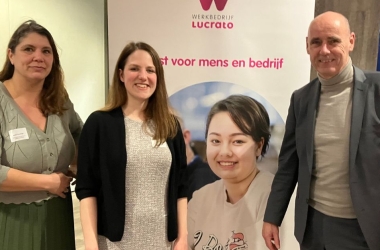Wittenborg Online News!
VR Glasses, 'Exoskelet' and 'Translation Earpieces': Innovative Ways to Address Inclusivity in the Workplace
VR Glasses, 'Exoskelet' and 'Translation Earpieces': Innovative Ways to Address Inclusivity in the Workplace
VR Glasses, 'Exoskelet' and 'Translation Earpieces': Innovative Ways to Address Inclusivity in the Workplace

Wittenborg's HR Manager Discusses How Companies in Apeldoorn Are Addressing Inclusivity
Maike Nuyken, HR (Human Resource) Manager, and Karen Penninga, Director of Corporate Governance at Wittenborg, attended an insightful meeting at Werkleerbedrijf Lucrato in Apeldoorn in December to delve deeper into the subject of inclusivity in the workplace.
The event, organised by VNO-NCW Midden, Bedrijvenkring Apeldoorn and Werkleerbedrijf Lucrato, brought together local entrepreneurs, company representatives and professionals to engage in discussions and promote inclusivity.
Nuyken said, "Inclusiveness is, of course, a topic very close to the heart of Wittenborg. These events are interesting for us in the HR Department to gain more insight and inspiration into how to further improve in those areas."
In order to explore various methods of engaging individuals with disabilities and understanding innovative approaches using technology to create opportunities for them, Nuyken also viewed this as an excellent opportunity to strengthen Wittenborg's local network and identify collaboration possibilities with other Apeldoorn-based companies.
"There were two impactful quotes in the speech that chairman Rijn Plateel of VNO-NCW Stedendriehoek shared to open the event," Nuyken said further. "One from Professor of Entrepreneurial Innovation Frido Smulders, 'Without inclusion, there would be no innovation within companies and without innovation, there would be no right to exist.' The other is from Martin Luther King Jr., stating, 'Inclusion is not just a matter of equality. It's a matter of justice.' I found these sentiments to be very true and particularly crucial considering the recent election results in the Netherlands."
Nuyken also commended Gerrie van Sunder from Werkleerbedrijf Lucrato for providing a compelling introduction to their initiatives, enabling approximately 1,000 individuals to find their way back to meaningful work, including people with disabilities, the long-term unemployed, refugees, etc. "It was incredible to witness his enthusiasm and dedication to this important work," Nuyken said.
Lysanne Scheijbeler from TINT further presented the work of their Technohub Inclusive Technology, with Nuyken emphasising, "This Technohub, in collaboration with SDD (Smart Dedicated Design), engages people, companies, educational institutions and governments to understand, learn and innovate with inclusive technology. They empower individuals with disabilities or language barriers, enabling them to perform work that would be otherwise challenging. This approach allows companies to tap into unused labour potential, fostering inclusiveness and addressing staff shortages."
Examples of this are 'vertaaloortjes' (translation earpieces) that translate between two languages, allowing a Ukrainian refugee to receive instructions from a Dutch supervisor, for example, or VR glasses paired with sensors that can guide employees in the assembly of products, allowing them to work autonomously and feel ownership of their work.
In a recent news article, TINT reported that in Apeldoorn and its surrounding areas, six organisations have already embraced the capabilities of their 'vertaaloortjes'. Companies like McDonald's, Mediant, Remkes, and Gelder Thuiszorg have expressed positive feedback regarding the efficacy of this technology.
Another innovative example driving inclusiveness is an 'exoskelet,' a wearable 'skeleton' controlled by the wearer. The exoskeleton aids in lifting objects and supports forward-bent work or physically demanding, repetitive tasks. It reduces the body's load by providing support to, for instance, the upper arms or lower back. Another example is 'game-based assessments,' where insights into personality traits and abilities are gained based on one's performance in games.
The company, IVY Works, for example, measures more than 120 personal characteristics with its game-based assessments. For example, games can improve memory or attention span. Executive functions such as planning and organising can also be measured. In addition, there are games available that determine whether someone recognises emotions in others. This is, for example, an important condition for empathy. By comparing the 1,000 data points, IVY Works can create an extensive profile on a person.
WUP 24/01/2024
by Erene Roux
643 words